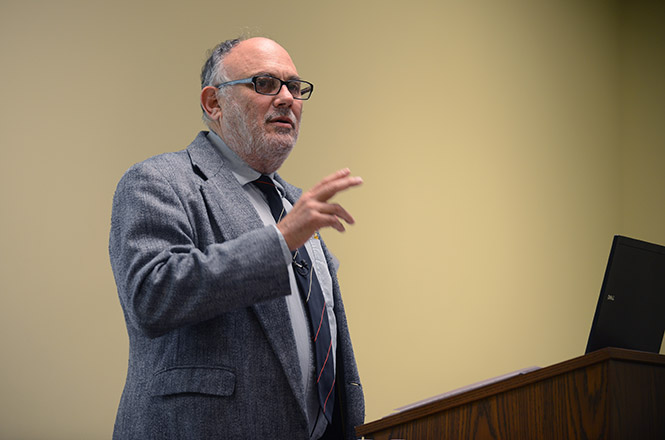Case Western scholar addresses modern technology’s effect on religion
Dr. Peter Haas, Department of Religious Studies at Case Western Reserve in Cleveland, visits Kent State University on Tuesday Oct. 22 to speak about how the internet is changing religion. Photo by Leah Klafczynski.
Peter J. Haas, Abba Hillel Silver Professor of Jewish Studies at Case Western Reserve University, addressed audience with the Internet’s effect on religion Tuesday night.
“The Internet is in fact creating new sorts of sacred space,” Haas said. “Religion as we know it is taking on an entirely different form.”
Haas spoke to a group of faculty, community members and students at 7 p.m. in the Student Center. The Center for the Study of Information and Religion hosted the Fall 2013 symposium, titled “The Ghost in the Machine: How the Internet is Changing How We Do Religion.”
Haas said he approaches religion as an anthropologist, and the Internet makes it possible for religious interaction to take place on the web.
“The web is creating its own version of religious space. Space that is virtual not real, like shopping or watching a movie or chatting with friends,” Haas said.
A website titled Second Life allows users to virtually attend an online mass. Second Life is a virtual world where users enter as an avatar where they can navigate throughout.
In one sitting, an individual can read the paper, check social networks, attend a religious service, play online games, and many other activities.
One does not have to step outside their home to participate in religious practices. Haas said the religious experience becomes homogenous with other various daily activities.
“Note that in the proceeding, I have enmeshed the religious service into a bunch of other activities,” Haas said.
Haas then proposed the question: “Is there anything religious about my participation when doing it on the Web in the steam of all kinds of other things I am doing?”
Haas gave a brief survey of three websites for religion based on community building. The websites included a Jewish, Catholic and Muslim community. He said the three websites shared similar features.
“I would venture to say that this commonality we have experienced in our brief visits suggest that all these sites understand themselves as addressing a similar audience. That is, educating American young people,” Haas said.
Jewish Studies Program Director Chaya Kessler said the speech was thought provoking and informative.
“It really touches on something ancient like religion and to say that something very modern that is the Internet and how do we reconcile these two worlds,” Kessler said. “How do we live in this world of constantly being plugged in and yet we keep something that is like the beyond or the sacred.”
The Internet is allowing users to access religious content at their fingertips. The three religious-community websites discussed by Haas are user-friendly and have sections designated to answering questions.
David Odell-Scott, professor and chair of the Department of Philosophy and Coordinator for the Religion Studies Program, said Haas offered new views on religious websites.
“I took away interesting anthropological examination of religious content on Internet sites and his exploration of what that means,” Odell-Scott said.
Contact Sydney Baltrusaitis at [email protected].


